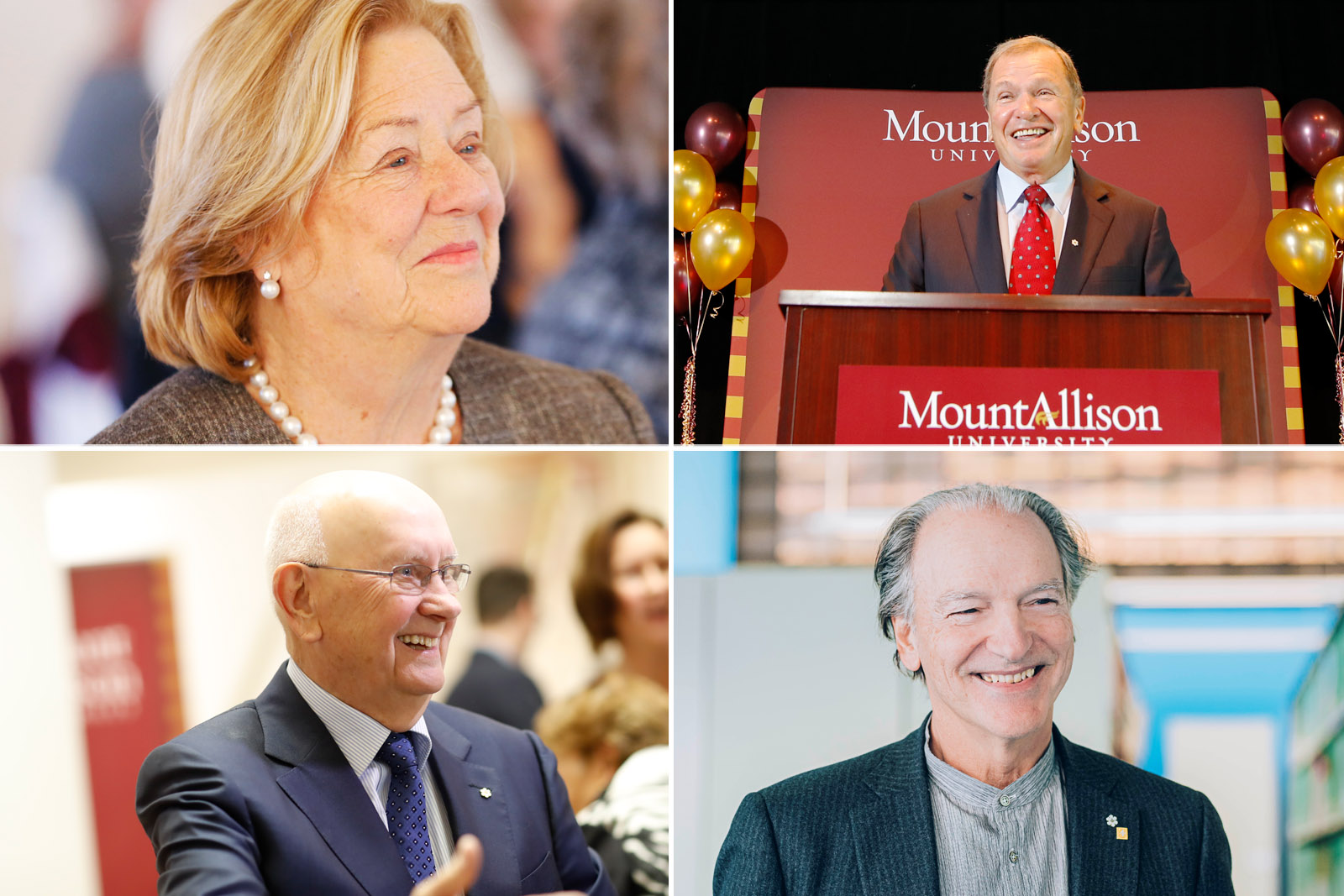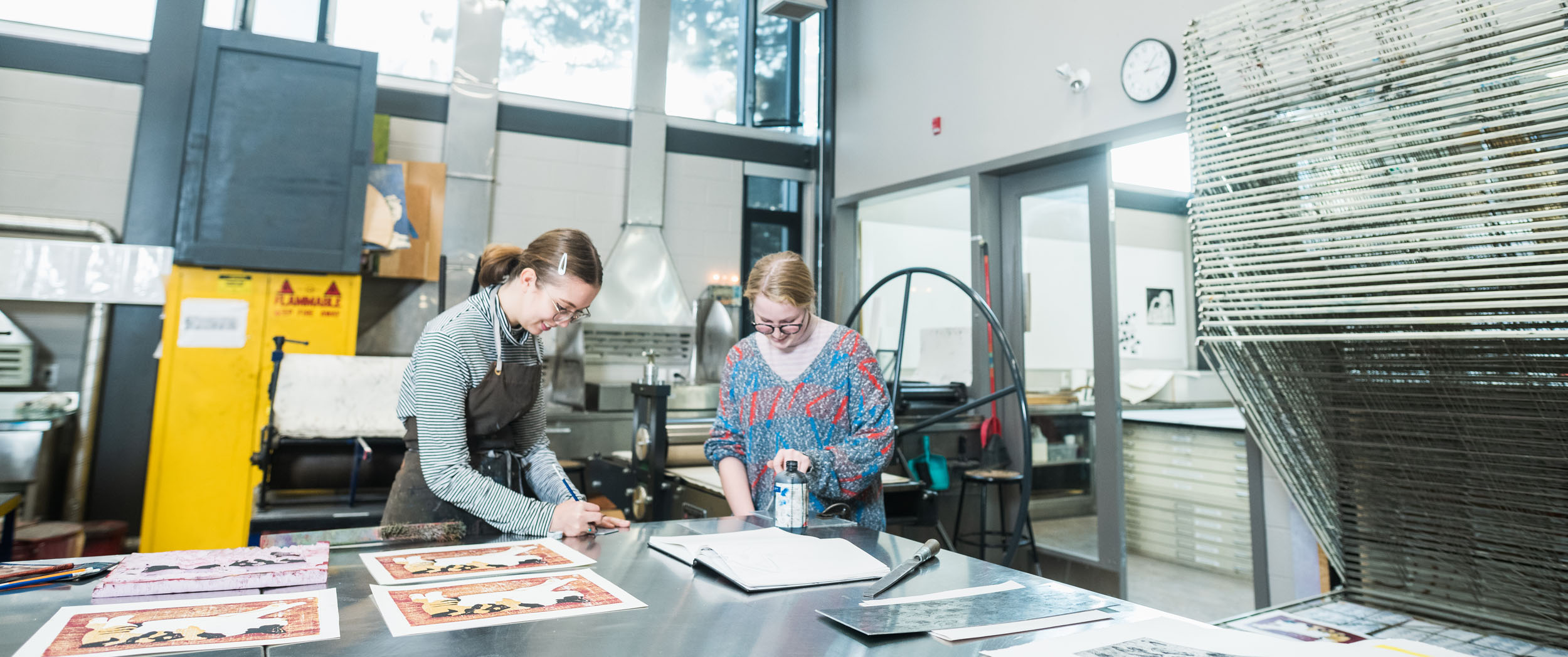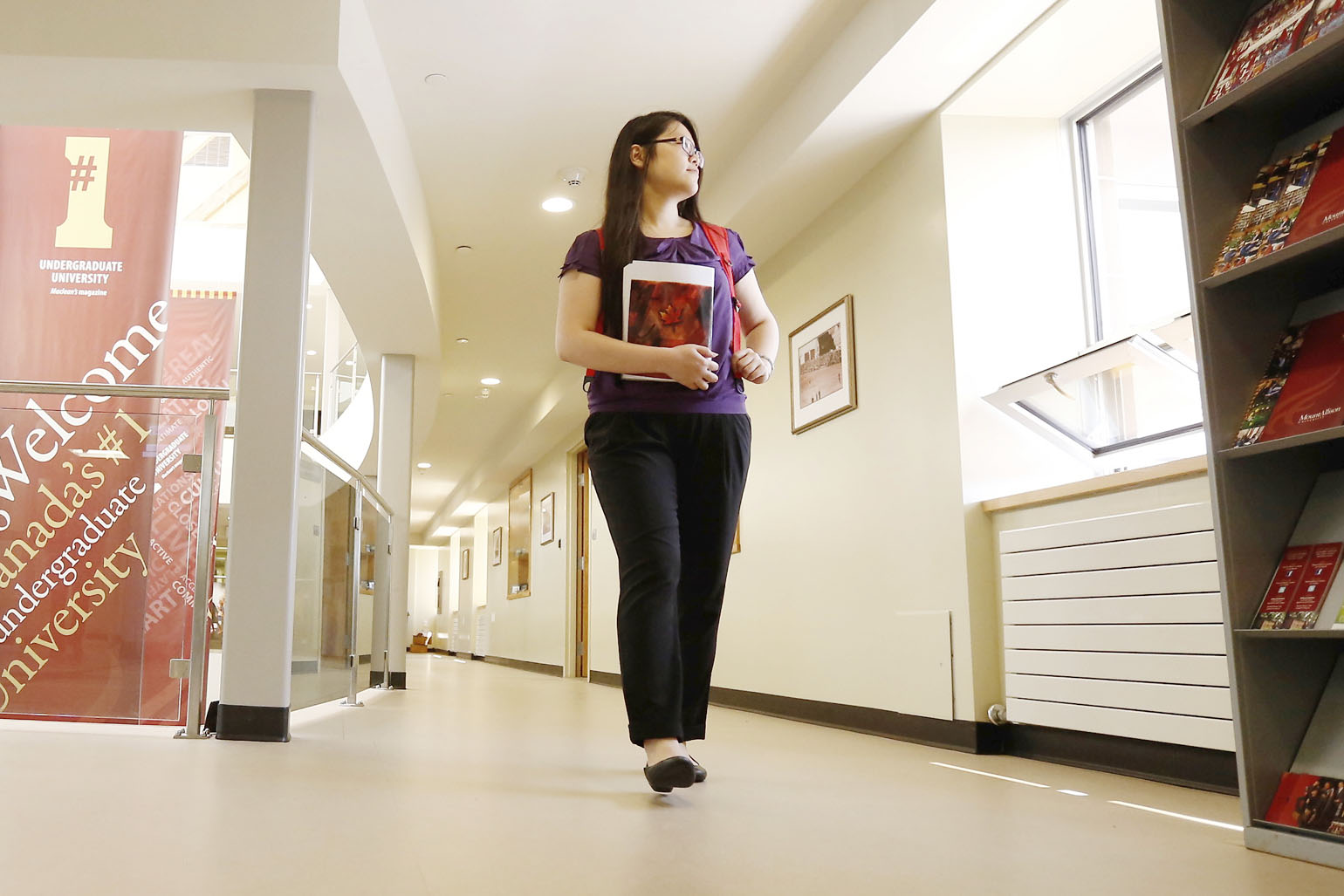Time, talent, and treasure
It is May 2021 and four noted Canadian philanthropists have gathered together on a Zoom call (how else?) at the invitation of President and Vice-Chancellor Dr. Jean-Paul Boudreau to discuss their views on philanthropy in general and Mount Allison in particular.
John Bragg (‘62, ’63, LLD ’93), Pierre Lassonde (LLD ’21), Margaret McCain (’54, LLD ‘95), and Frank McKenna (LLD ’91) represent an interesting mix of Mount Allison benefactors.

Bragg and McCain are graduates and have been giving back to their alma mater for decades. Lassonde and McKenna are newer to the fold, but both have connections here — McKenna from his time as Premier of New Brunswick; Lassonde’s son-in-law is an alumnus. All have made leadership gifts to the University in the past year — McKenna and Bragg helped establish the Frank McKenna School of Philosophy, Politics, and Economics; McCain set up the McCain Scholars, a scholarship program that recognizes resilience, creativity, and leadership; and Lassonde supported the creation of the Pierre Lassonde School of Fine Arts.
All four are household names in the world of business or public service — sometimes both. Bragg, a former Mount Allison Chancellor, is best-known as President and CEO of Oxford Frozen Foods. Lassonde is a businessman, a noted collector of contemporary Canadian art, and past Chair of the Canada Council for the Arts. McCain, Mount Allison Chancellor Emerita, was the first female Lieutenant-Governor of New Brunswick. McKenna, former New Brunswick Premier and former Canadian Ambassador to the United States, is currently Deputy Chair, Wholesale Banking, TD Bank Group.
This is also a group of people who actively live out the three Ts of philanthropy — giving of their time, talent, and treasure — and who have given a great deal of thought to what it means to give back, why one might choose to do so, and how to make a gift with lasting impact.

Impact is something Lassonde says his family’s foundation considers with every gift it makes.
“Using the time you have, the talent you have, the treasure you have, where can you have the most impact?” he says.
Bragg counsels giving to something in which you have an interest, one of the reasons he has supported Mount Allison.
“(Mount Allison) is a place you can make a difference and it is a place where philanthropy has made a tremendous difference,” he says.
Lassonde, a first-time donor to Mount Allison, was drawn to the University because he too could see this potential.
“We want to work with organizations that are open, that are dynamic,” he says. “I didn’t know anything about Mount Allison and then I found out that (Alex) Colville taught there, Mary Pratt went there — I thought, ‘How come I don’t know any of this? Why aren’t we talking about this? And how can I help?’”
‘How can I help?’ is a question all four philanthropists ask. They see philanthropy as a means to support organizations and institutions like Mount Allison in taking risks, trying something new, or advancing innovative ideas, support that is needed now more than ever. Even without a global pandemic to hasten things along, the world has been changing at an increasingly rapid pace.
“Our graduates have to be prepared to function in a much larger world than John, Frank, Pierre, and I ever considered when we were students,” McCain says. “Knowing our strengths, knowing what we can offer, and building on our local strengths to function globally is key for universities right now.”

McKenna says it is an extraordinarily challenging time for young people, who need to be equipped to face and solve complex problems.
“We live in a world where your wristwatch has more computing power than the computer that put a man on the moon. We live in a world where there is instant obsolescence. And we live in a world of social media where everything is challenged and where small people with big megaphones end up having an inordinate influence on our lives,” he says. “So, I think we need to produce people that may have a BA in economics or English, but a PhD in character — people with the ability to think independently and for themselves, to sift through all the noise that is coming at them every day to figure out what is true and right and just and appropriate. And that takes a different skill set than just knowing economics or just knowing math.”
Lassonde concurs, noting that five of the biggest companies listed in the Dow Jones Industrial Average today did not exist 20 years ago.
“Your graduates are going to go to jobs that did not exist two or five or ten years ago. How do you prepare graduates for that?” he says. “I would argue that liberal arts colleges are more necessary than ever because the kind of education you want to give to kids is a liberal arts education, a general education. Why would you want to train someone in something that is going to disappear or may not be there when they graduate? In that respect Mount A is needed more than ever.”

McCain says a focus on a high-quality undergraduate education is often lost in larger universities, which leaves smaller schools like Mount Allison in a position to offer something not available anywhere else.
“When I look at the undergraduate education that I had, much of it took place outside the classroom. The quality of life, the quality of the courses is extremely important to inspire a thirst for learning and to prepare them for the big world out there,” she says. “Creativity and innovation are going to be extremely important.”
Bragg sums it up.
“We still need to have institutions where we teach kids how to think and how to learn from others, to accept other ideas and to open their minds,” he says.
All concur that experiential learning — where students learn by doing — is going to be key in helping to prepare today’s students for tomorrow’s career paths, and that philanthropic support will be needed to help create these opportunities.
And that is what brings a place like Mount Allison and philanthropists like these four together: finding ways to better serve the needs of a changing world. Each of these four sees the role Mount Allison can play and each wants to find a way to help make that happen.
“You need multiple tools in the tool chest to manage and Mount A is an institution that can provide all of that,” McKenna says. “It is exactly what I think is so special about an institution like Mount A — the ability to bring a lot of complex tools to a problem, rather than a single tool in the tool chest.”
‘Philanthropy not all about giving money’
President Boudreau asked what advice these long-time philanthropists had for those who are just beginning to explore giving back.
“Indulge yourself in philanthropy. Money puts food on the table, but philanthropy is soul food.” — Frank McKenna
“Find an area you have an interest in because you will get more satisfaction from donating where you can make a difference and where you have an interest.” — John Bragg
“Look under the covers. Make sure it is rooted in good, strong, evidence-based research. Very often a program appears to be very good, sells easily on the surface, but look under the covers and you find it can do harm. This is something philanthropists need to be very conscious of. Make sure your money is going to do good and not harm.” — Margaret McCain
“For young philanthropists, when you look at time, talent, and treasure, you may not have a lot of treasure, but you are full of talent and may have a bit of time… The talent aspect of philanthropy is so often under-rated or ignored and yet it is critical — that is what most organizations need the most.” — Pierre Lassonde
“Some of the most sustainable philanthropy has been given by people who didn’t have money, but gave time and talent. One of the things that keeps a lot of philanthropists in the closet is that they don’t have a lot of money to give, but in fact they have a lot to give. Philanthropy is not all about giving money.” — Margaret McCain
Find out more
Frank McKenna School of Philosophy, Politics, and Economics
Established in 2020, the Frank McKenna School of Philosophy, Politics, & Economics will complement new learning and scholarship, and build the next generation of critical thinkers, global citizens and career-ready graduates.
Pierre Lassonde School of Fine Arts
The Pierre Lassonde School of Fine Arts features innovation in education and training for the next generation of professional artists and arts professionals, and builds on the program’s long-standing history in and support of the arts.
The McCain Scholar Program is distinctive in that these high-value renewable scholarships recognize and celebrate the non-academic achievement. Student recipients (five each year) will reflect a wide range of experiences and interests.


